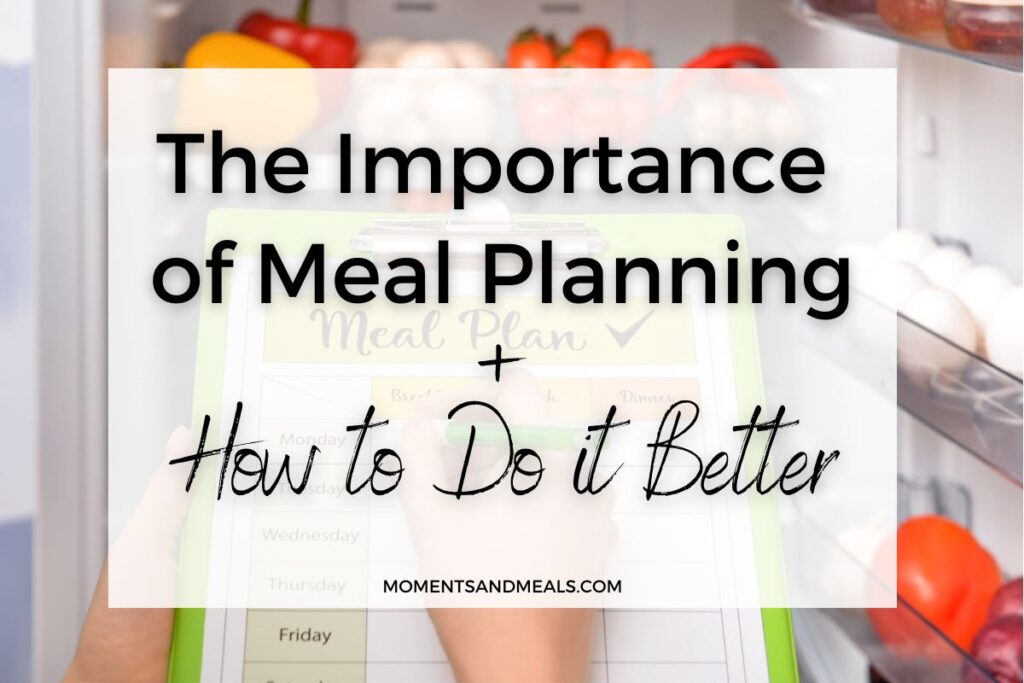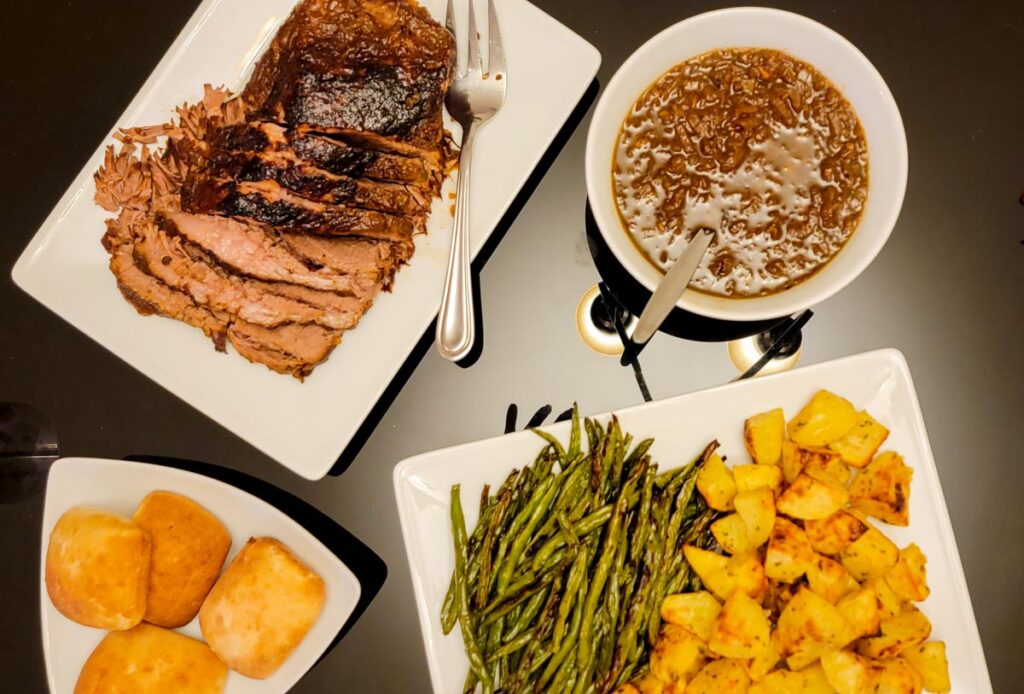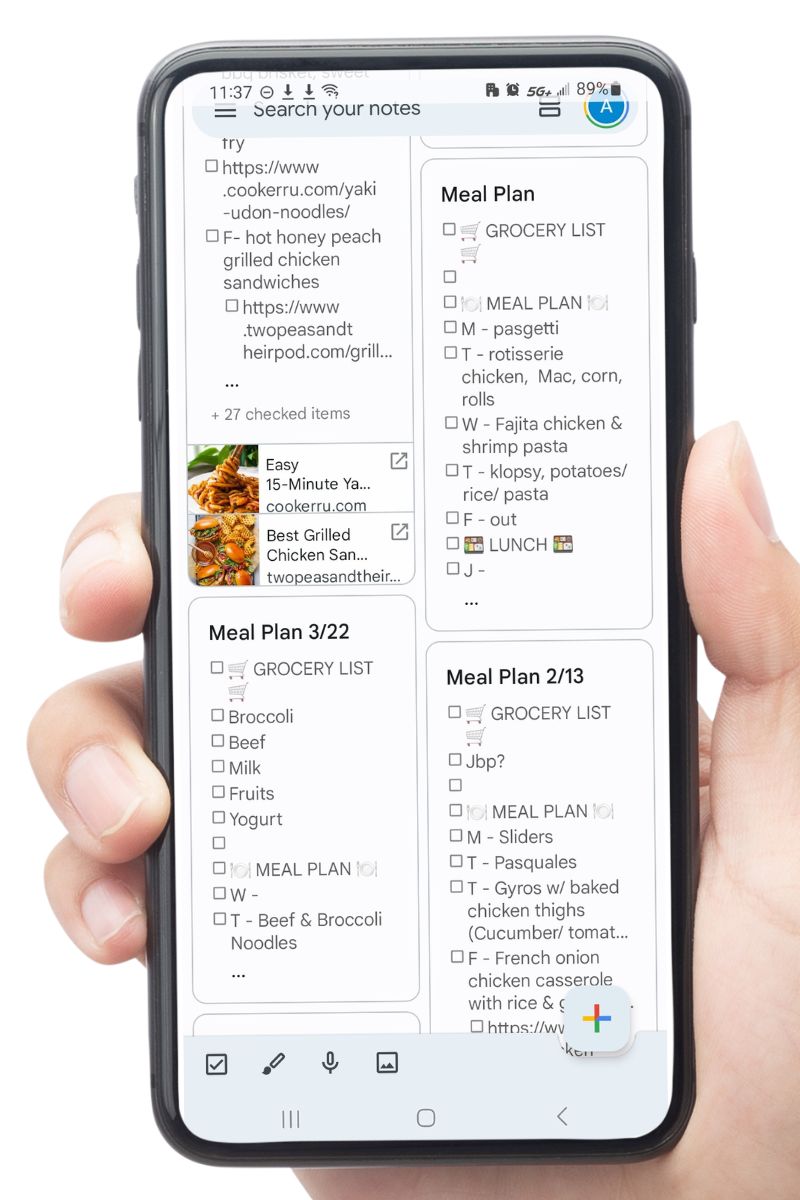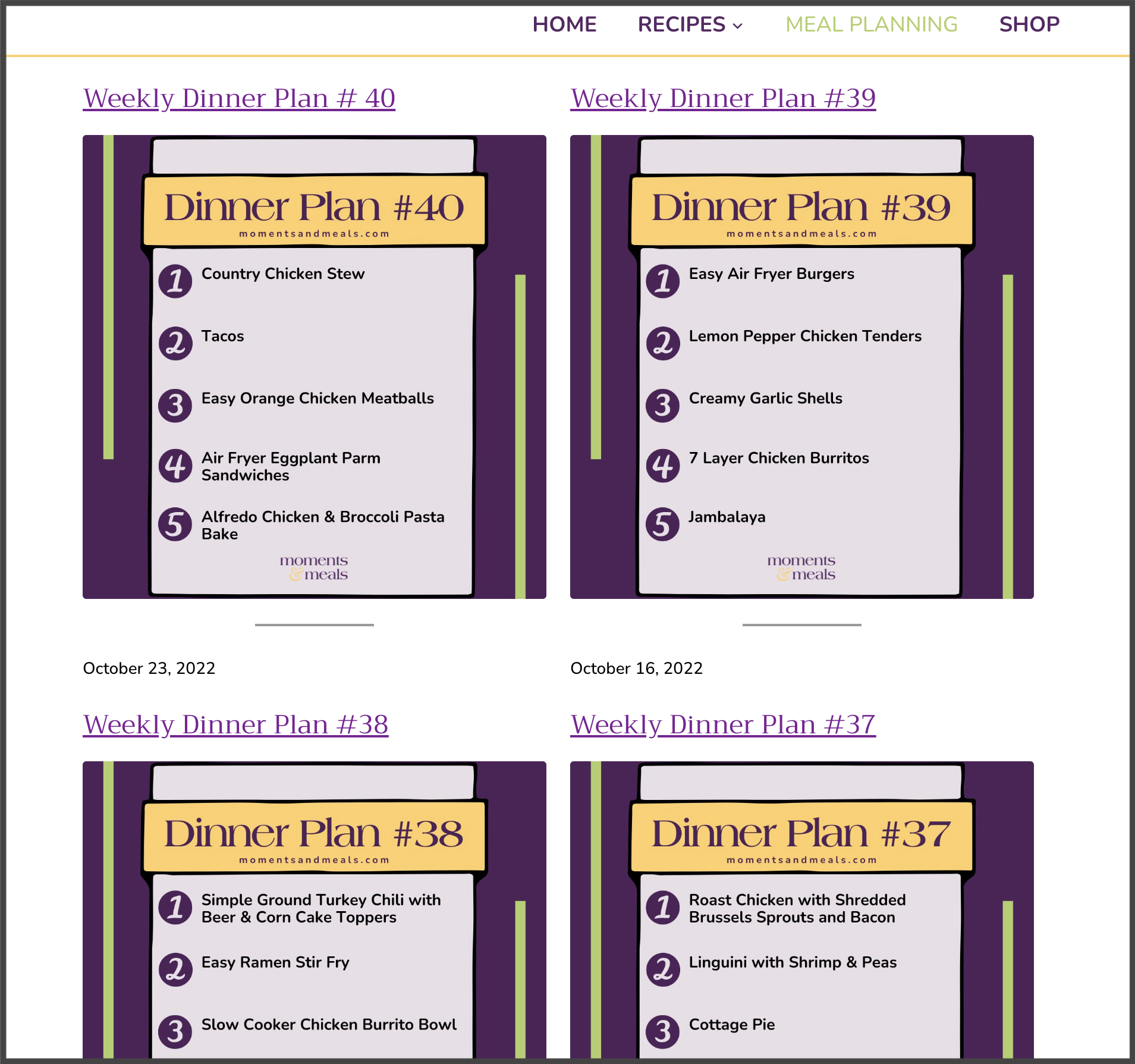Discover the importance of meal planning and how it can help simplify your life. From saving time and money to reducing stress, learn how meal planning can transform your approach to mealtime.

TABLE OF CONTENTS
As busy and expensive as life can be nowadays, it’s no surprise that mealtime can be downright overwhelming. With work, school, and extracurricular activities, finding the time to plan, shop for, and prepare home-cooked meals can feel like a cruel joke and you’re finding yourself spending far too much money on fast food and takeout. But there is a solution: Meal planning!
Before you brush it off, meal planning is not just for over-achievers! It’s a tool that normal, busy people like you can use to streamline their routines and simplify their lives. It can save precious time and money, while reducing stress and improving nutrition. And it’s the solution you need to make mealtimes more enjoyable for you and your family.
I know what you’re thinking: “I don’t have the time or brain power to meal plan!” Trust me, I get it. But the truth is, meal planning doesn’t have to be a time-consuming chore. And meal planning does NOT mean prepping. Simply creating a weekly menu and getting your groceries for the week will save you loads of time and stress each day. Still skeptical? Keep reading for all the benefits and importance of meal planning as well as some tips to help you get started and stay on track.
TOP 5 BENEFITS OF MEAL PLANNING
Meal planning can provide numerous benefits for busy families. By planning dinners in advance, you can:
1. Save Time and Reduce Stress
As a busy parent, you know that time is a precious commodity. By planning out your meals for the week ahead of time, you can save yourself the stress and hassle of figuring out what to make for dinner each night. This means less time spent standing in front of the fridge, trying to come up with dinner ideas, and more time to relax with your family (or maybe tackle that laundry pile, finally?)
2. Save Money
One of the biggest benefits of meal planning is that it can help you save money on groceries and avoid last-minute junk food or restaurant meals. By planning out your meals in advance, you can avoid overbuying and reduce food waste. You’ll also be less likely to make impulse buys when grocery shopping.
3. Promote Nutrition and Healthy Habits
In our busy lives, poor planning often results in poor food choices. Meal planning allows you to take control of your family’s nutrition and ensure that everyone is getting the right balance of nutritious food. Having a dinner schedule in place with quick and easy, but well-balanced meals can help you avoid the temptation of reaching for fast food when you’re short on time. Plus, meal planning can help you incorporate more fruits, vegetables, and whole grains into your family’s diet.
4. Reduce Food Waste
Did you know that the average American family throws out about 25% of the food they buy? Meal planning can help you reduce food waste by allowing you to buy only what you need and use up ingredients before they go bad. This not only saves you money but also helps the environment by reducing the amount of food that ends up in landfills.
5. Encourage Family Participation
Meal planning can be a fun and creative activity that you can involve your whole family in. Get your kids involved by asking them to help you pick out recipes or by letting them choose a meal for the week. This not only helps to promote healthy eating habits but could encourage picky eaters to be more open to trying new foods!

HOW TO GET STARTED
Getting started with meal planning is easier than you might think!
- Set aside time to plan: Choose a time each week to plan out your meals for the upcoming week.
- Inventory what you have: Check your pantry, fridge, and freezer to see what ingredients you already have on hand.
- Choose your recipes: Browse cookbooks, online recipe sites, or use a meal planning service to find recipes that fit your dietary needs and preferences.
- Make a grocery list: Create a shopping list based on the recipes you’ve chosen and the ingredients you need to buy.
- Shop for groceries: Head to the grocery store (or order online) and purchase the items on your list.
- Prep in advance: Chop vegetables, cook rice or pasta, or marinate meat in advance to save time during the week.
TIPS AND TRICKS FOR BETTER MEAL PLANNING
To make meal planning easier, here are some simple tips to help you stay on track and avoid common pitfalls:
Be Realistic & Flexible
For some people, a strict meal schedule can be too rigid. Instead of planning to cook for every night of the week, try planning for a few meals and leaving room to switch things up as needed.
Having the ingredients on hand for planned meals, but not feeling pressured to make a certain meal on a certain day, can make menu planning feel less stressful and more sustainable in the long run.
Check Your Calendar
Before starting your meal plan for the week, it’s a good idea to check your calendar for any events, extracurricular activities, or late nights at the office. This can help you plan for a super quick meal, double batch a previous meal for leftovers, or intentionally schedule these nights as take-out nights.
Shop Your Kitchen First
Before heading to the grocery store, take a look in your fridge, freezer, and pantry to see what ingredients you already have on hand. Think of creative ways to use up ingredients that may be close to expiration, such as incorporating stray carrots into a stir-fry or using leftover chicken in enchiladas. You may be surprised at how many meals you can create using the ingredients you already have on hand.
By shopping your kitchen first, you’ll also be able to create a more focused grocery list and avoid buying duplicates or items you don’t need. This can not only help you save money but also reduce food waste.
Incorporate Variety
It’s easy to create a list of meals your family enjoys and simply rotate them each week. But let’s be honest, that can get boring quick.
One of the keys to successful meal planning is to incorporate a variety of foods into your meals. This not only helps to keep things interesting but also ensures that your family is getting a wide range of nutrients. You can still keep a list of your favorite meals on hand and incorporate them into your weekly menu while trying new recipes as well.
Mark Off-Limit Foods
Have you ever gone to make dinner and suddenly realize an ingredient you need is gone? Someone went and had themselves a little snacky-snack and now you’re having to deal with how to make dinner without it.
Try using sticky notes to label off-limits ingredients that are meant for specific meals.
Alternatively, you can invest in a few clear containers to store ingredients for upcoming meals. By gathering the necessary ingredients in one container, you can easily grab it on the night of the meal, reducing the time spent searching around the kitchen and ultimately reducing meal prep time.
Keep Meal Prep Simple
Meal planning can also include preparing and storing your meals, but it doesn’t have to be an all-day event! Do anything that feels attainable for you. Even one or two small preps can be a tremendous help on busy days.
One way to use meal prepping to your advantage is batch cooking. Cook a large batch of meatballs to use in spaghetti one night, teriyaki rice bowls another night, and freeze a portion or two for another week.
You can also prep partial ingredients ahead of time, such as chopping vegetables or making dressings, sauces or marinades so they’re ready to go. Another time- and money-saver is to purchase chicken breasts in bulk and prep into freezer bags. Make portions that are sliced, some that are diced, and others simply fileted.
Take Advantage of My Weekly Meal Plans
To make meal planning even easier, or simply for inspiration, check out my weekly meal plans archive. These are a helpful and time-saving resource that provide you fresh ideas each week and cut down on the process of planning. I source tons of easy recipes, provide helpful info on ingredients and substitutions, tips for meal prepping, and more. It’s one less thing to worry about!
Use a Notes App
Another tool that can make meal planning more effortless is a Notes app on your phone. Use it to store your meal plans so you can go back to previous weeks to re-use plans, notate or tag dinners you especially liked for future reference, and quickly add ideas on the go.

PLANNING FOR PICKY EATERS AND DIETARY NEEDS
Dinner time can be especially stressful when you have picky eaters or family members with specific dietary needs. But meal planning can actually help reduce the stress and frustration! By planning ahead, it’s easier to adjust your meals while still making delicious and healthy food the entire family can enjoy! Here are some tips for meal planning for picky eaters or special preferences:
- Plan for ingredient swaps
If you have a picky eater or family member with a specific dietary restriction, plan for ingredient swaps or adjustments that can still make the meal enjoyable for everyone. For example, if you want to make shrimp tacos but your toddler hates shrimp, you can plan to make a ground beef dinner the day before, saving a small portion of the beef for the following day so you can reheat it for your toddler.
- Keep it simple
When meal planning for picky eaters, keep it simple. Stick to familiar ingredients and flavors that everyone likes, but incorporate some variety to keep things interesting and allow for exposure to new foods.
You can even involve your family in the meal planning process, asking them for their input on what they’d like to eat during the week. This can be particularly helpful with picky kids as it can make them feel more in control of what they’re eating and therefore more willing to try new foods.
- Prep ahead of time
Meal prep can be especially helpful when meal planning for picky eaters or dietary needs. By prepping ingredients or even whole meals ahead of time, you can save time and reduce stress during busy weeknights. You can also label and store different portions separately, making it easy to adjust meals based on individual needs.

PLANNING FOR DIFFERENT LIFESTYLES
Meal planning can also be challenging for unique lifestyles so it’s important to tailor your meal planning to your individual needs. For example,
Work From Home
If you work from home, you may have a more flexible schedule than someone who works outside the home. However, this doesn’t mean that you have more time for meal preparation each night. In fact, it can be even more challenging to stay on top of dinner when you’re in the same environment where you work and relax.
To make meal planning work harder for you, take advantage of your flexible schedule. Take two minutes in the morning to think through that evening’s dinner and see if there is anything you can start prepping during the day. Can you chop vegetables during your lunch break? Or get meat into the slow cooker by late morning?
Families with Lots of After School Activities
For families with children who have lots of extracurricular activities, meal planning can be a lifesaver. Being prepared for late nights or whirlwind afternoons can save you from eating fast food night after night.
Schedule cooking in large batches on calmer nights or over the weekend so that you have wholesome meals ready to reheat and take on the go in a thermos. Plan for slow cooker meals that are ready when you get home or try simple sheet-pan, one-pan, or air-fryer meals that can be thrown together with little effort and cook while everyone gets ready to leave for evening practices.
Night Shift Workers
For those who work the night shift, mealtime can be particularly challenging. Consider planning slow cooker meals that you can prep and start cooking before you head off to sleep. Once you wake up, a fresh homemade meal is just about ready for your family to eat and you to pack for later. You can also prepare meals in advance and freeze them so you have a stash of pre-made healthier meals ready to go.
HOW TO OVERCOME COMMON CHALLENGES
Meal planning can be a great tool to help simplify your life, but it’s not always easy. Sometimes you can get overwhelmed with decision fatigue, or find that you’re lacking the time or motivation to plan.
It’s OK to take a step back and just wing it for a week or two if you need. But then push yourself to re-start and get back on track. It’s likely that you’ll find your groove again and realize you enjoy being prepared for dinners each week! Here’s some tips and ideas for overcoming common challenges of meal planning:
Overcoming Lack of Motivation
It’s easy to start off strong with meal planning, but over time you may find your motivation dwindling. This could be due to a lack of variety in your meals or simply feeling burnt out from planning and cooking.
To overcome this, try switching things up with new recipes or cuisines. You can also enlist the help of family members or friends to cook with you or even start a meal-planning group. Setting small goals and rewarding yourself can help keep you motivated.
Sticking to a Budget
Meal planning can be a great way to save money on food, but it can also be challenging to stick to a budget.
To overcome this, start by setting a realistic budget each week. Then, look for sales and coupons at your grocery store, and plan your dinners around these deals. Finally, consider shopping at bulk discount stores. This is a great way to not only save money, but buying in bulk allows you to more easily double batch recipes and store them in the freezer for easy home-cooked meals that can be merely reheated on the busiest days.
Finding Time to Plan
One of the biggest challenges of meal planning is finding the time to actually sit down to research recipes, plan out the week’s meals, and make a shopping list. Between work, family, and other obligations, it seems finding spare time is akin to finding a magical unicorn.
Yet, if you truly think about how long it takes you to come up with dinners each night and make multiple trips to the grocery store throughout the week, you’ll find that you are probably using more precious time than if you had just blocked off an hour or so and focused on creating that meal plan.
If you’re struggling to find the time to plan out your meals each week, check out my weekly meal plans. They’re designed to take the stress out of meal planning by providing you with delicious, healthy(-ish) recipes and a few even come with a complete grocery list!
Use your spare minutes wisely. Waiting for a work meeting to start? Sitting in the doctor’s office waiting room? Think of one or two dinners and add it to your plan for next week. You’ll have your weekly menu done before you know it.
Meal planning is a powerful tool for improving your eating habits and overall well-being. By taking a little time each week to plan out your meals and groceries, you can save time, reduce stress, and eat healthier. It doesn’t have to be complicated or time-consuming, and with a little practice, it can become a natural part of your routine. Remember to be kind to yourself and stay flexible!





